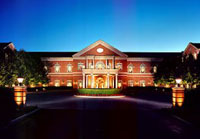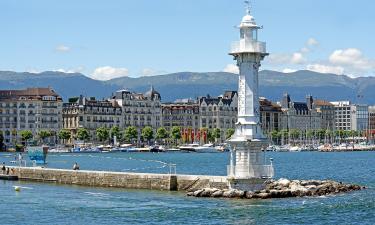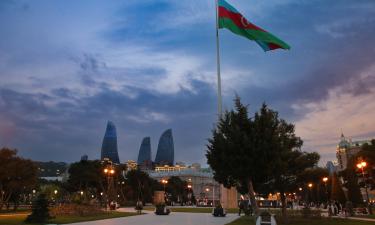Bilderberg: the meeting of the mediocre minds
By Hans Vogel

Practically no one has been reporting on the 2009 meeting of the Bilderberg group in a fancy seaside resort near Athens. The Greek newspaper To Vima, however, published a list of the 150-odd participants at the conference. The Guardian has published some articles by Charlie Skelton, who was incessantly being harrassed by Greek police and even arrested for trying to do his job as a journalist. Nothing new here, since from the very beginning, the Bilderberg conferences have been shrouded in secrecy.
Russian-born Daniel Estulin, the man who knows most about the Bilderbergers and who has published extensively about their wheelings and dealings, has declared that this year's attendants discussed how to manage the world economic crisis they allegedly engineered themselves. Basically, details are unknown, although one may deduct some facts from the publication, by Wikileaks, of the reports of earlier Bilderberg conferences. I have no reason to disagree with Estulin, but I would like to suggest some points to take into consideration.
The list of participants is a good starting point. Led by four representatives of European royalty, the list contains mostly the names of politicians, high civil servants, bankers and CEOs. Politicians are dependent on public favor, which today is largely manufactured by venal media. And as we all know, if there is anything politicians, especially modern ones, are lacking, it is a spinal column. The bankers are just that: bankers, managing other people's money. The CEOs are lavishly-paid employees of corporations, taking decisions about other people's investments. Mind you, none of these bankers and CEOs have adventurous minds. They are not entrepreneurs who have set up their own business, risked their own savings and turned te venture into a success, like, for instance, Richard Branson. These bankers and CEOs are mere bureaucrats. So are the high civil servants from various nations and the “European Union.” Needless to say, the high civil servants are bureaucrats, by nature. As for the occasional soldier (David Petraeus), or glorified thug (Richard Holbrooke), these are also people who must carry out orders. If their biographies show anything, it is precisely that they are very good at this.
In case you would be looking for innovative ideas, for ideas on how to cope with the ongoing crisis, who would you ask: a succesful businessman like Richard Branson or some incompetent CEO who was foolish enough to take his bank to the edge of the abyss by buying obscure financial products from failed US companies such as Lehman Brothers?
Thus, the overwhelming majority of those attending the recent Bilderberg conference are dependent people, men and women who made their careers by suppressing their own initiative and taking orders, always alert to any opportunity for advancement. In other words, most 2009 Bilderbergers, like most of their many predecessors, are people of limited imagination, with a limited capability of independent thought. For if they had any independent or original ideas in the past, these would certainly have interfered with their careers or they would by now be suffering from awful cancers and other nasty diseases. Apparently, however, all are in good health. Besides, a round table conference in a big room with well over a hundred participants, no matter how open and freely they may express themselves, is hardly conducive to the transmission of creative thoughts. As anybody knows who has been present at large meetings with more than a dozen people, many participants will be fighting against boredom, yawning, looking at the ceiling, doodling on a sheet of paper. On similar occasions, I have witnessed people dozing off, even snoring. Usually during conferences, the real business is done in the corridors, over coffee, or while strolling through the garden. Even then, shop talk is often squeezed between longer and more interesting discussions on second homes, vacations, the kids, the looks and legs of the secretaries, or the finer points of tax evasion. I am talking about scholarly conferences (just read David Lodge's novels to get an idea). Why should it be different at a Bilderberg conference?
There was a significantly strong presence this year of Greeks, Turks and Spaniards. The Greek participation is expmained by the fact that the Bilderberg meeting took place in their country. Moreover, Greece is one of the countries where violent street demonsrations earlier this year have shaken the government and where the effects of the current crisis are being felt most acutely. But the Turks? They are the neighbors of the Greeks, but we may suspect there was a lot of talk of how to get them to join the “European Union” after all, overriding both official (French) and widespread popular opposition all over Europe. The Spanish presence, led by their Greek-born Queen, was also interesting. Coincidentally, Spain has been affected very badly by the economic crisis, with staggering unemployement rates, a collapse of the real estate market, and structural, widespread discontent among the young. For years now, young Spanish men and women have been unable to find jobs. Over the past years, Spain has had the highest unemployment rate among the young. It must have been interesting and disconcerting for the Bilderbergers, to hear about the Greek and Spanish experience of the effects of the crisis.
The conference participants may have been doing a lot of talking, but we can be pretty sure imaginative or new ideas, fresh approaches, exciting concepts, daring proposals were at the very best few and far between. And even that is probaby a kind assessment. Of course, something new, fresh, exciting or daring may have been discussed, but then it will not have sprung from the minds of any of the participants, but rather picked up from one of their underlings at home.
Some Bilderbergers (such as Roger Altman or Neelie Croes, the Dutch Eurocommissioner) are known to have been associated with white collar crime, others are just plain criminals, such as Holbrooke, who in the 1990s played a major role in the massacre of 6.000 Serb civilians. Nato scretary general Jaap de Hoop Scheffer is another criminal, who by officially supporting the US conquest and occupation of Iraq, is in part guilty of the murder of close to 1.5 million Iraqu civilians. No doubt quite a few others could be added to this list. With such criminals in their midst, the moral authority of the Bilderberg conference goers is quite limited, to say the least.
Essentially the majority of the Bilderberg group meeting at Vouliagmeni last week may be defined as mediocrities. “Apparatchiks” as they used to used to be called in the Soviet Union, well-paid “salarymen” as they say in Japan. Mind you, the real movers and shakers in the world were not present. Most, such as Obama, Medvedev, Soros, the Pope were doing their moving and shaking at home or elsewhere. Moreover, the Bilderberg conference was attended exclusively by men and women from Europe and the US. Okay, a few from Turkey as well, if you would consider it a European nation, which many people, including French President Sarkozy do not. There was no one from Russia, China, India, Japan or Brazil, to name just a few essential powers. This was not the G-20 conference at London. That was much more representative of real power in the world today.
Of course, the Bilderbergers may BELIEVE they are powerful and influential. In fact, they are riding a huge monster that is growing stronger every day. A monster they may believe they can control, but all they can see is the back of the fearsome creature they are sitting on. If they would be standing were the rest of us are standing, namely on the ground, they would be able to see the full size of the monster. Its name is CRISIS, spelled in capitals, because it is an economic, a social, a cultural and a political crisis.
Now, apart from the current crisis and its effects, what may have been the topics on the Bilderberg agenda? I suspect one of the main points of discussion has been the imminent threats to national security, public safety and governmental stability posed by the crisis. That is why US National Security adviser James Jones was there along with an NSA-boss (Alexander), former British spy chief Dearlove and US black leader Vernon Jordan (“for Heaven's sake let's make sure the Blacks are on our side,” must have been one of the main reasons for inviting him). There was also the Dutch minister of justice (Hirsch Ballin) and one Hans Vissers, whose professional identity may be that of a Dutch police chief. Another topic must have been the military disaster in Afghanistan, which explains the presence of both Holbrooke and Petraeus. Their accounts must have been depressing indeed. At any rate, the prevailing mood at the meeting has most likely been one of despair and puzzlement.
Clearly, the Bilderbergers are not superior minds, have no moral authority and are for the most part just “willing executioners,” taking their orders from higher up and for the rest, groping in the dark, like most people. Why then are they suspected of wielding a lot of influence? Part of the answer lies in the fact that the Bilderbergers obviously will not help to destroy the myth of their might. The more their meetings are kept secret, the tighter the security that surrounds them, the stronger the myth will be. Let us, for the sake of argument, assume that indeed the Bilderberg meetings set the political and economic agenda for the US and Europe. That would mean that those who ultimately wield the real power—presidents, prime ministers, cabinets, parliaments—are relying on a disparate group of mediocrities. This may indeed be the real situation, but it would only emphasize their own mediocrity and lack of ideas and imagination. Of course, this may actually be true, but in that case, a revolution making an end to the rule by halfwits and nincompoops may be a lot nearer than we think. Come to think of it, perhaps that is why there was such a notable presence of national security and “intelligence” officials at the Vouliagmeni meeting! At least, the Bilderbergers are intelligent enough to appreciate the seriousness and the looming threat of the current crisis. There is still hope!
Subscribe to Pravda.Ru Telegram channel, Facebook, RSS!




